|
|
|
Sort Order |
|
|
|
Items / Page
|
|
|
|
|
|
|
| Srl | Item |
| 1 |
ID:
130911
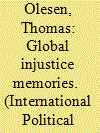

|
|
|
|
|
| Publication |
2012.
|
| Summary/Abstract |
Within a relatively short span of time, and culminating with the tenth anniversary of the genocide in 2004, the 1994 Rwanda genocide has become a key global injustice memory. At the core of this process is a double-sided conception of injustice: on the one hand, the genocide in itself clearly constitutes a major injustice; on the other hand, injustice claims have been expanded to encompass actors outside of Rwanda who observed the horrors without instigating sufficient action to halt, or at least mitigate the effects of, the unfolding genocide. It is the fact that moral and political responsibility for the genocide has been so powerfully expanded to third parties in a spectatorship position that most vividly testifies to the global character of the Rwanda injustice memory. The article identifies and analyzes four areas in which the transformation of the Rwanda genocide from national event to global injustice memory has occurred: institutionalization, expressions of regret, analogical bridging, and cultural products. The article argues that the transformation of non-Western events into global injustice memories has so far been insufficiently explored within International Relations and global political sociology.
|
|
|
|
|
|
|
|
|
|
|
|
|
|
|
|
| 2 |
ID:
130910
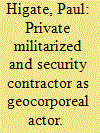

|
|
|
|
|
| Publication |
2012.
|
| Summary/Abstract |
As a consequence of the ontological and epistemological traditions dominating the private military and security company literature to date, the embodied dimensions of the industry have been overlooked. The current article addresses this lacuna through a phenomenological focus on the links between military corporeal conditioning, possibilities for the industry's emergence, and the impact of contractors on security. I develop the concept of geocorporeality to make explicit the geopolitical relevance of security contractors' military trained bodies. The article concludes by drawing out the implications of this embodied line of enquiry for questions of contractor accountability and agent intentionality.
|
|
|
|
|
|
|
|
|
|
|
|
|
|
|
|
| 3 |
ID:
130912
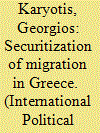

|
|
|
|
|
| Publication |
2012.
|
| Summary/Abstract |
The field of security is largely controlled by elites who, by virtue of their authority, are able to create an image of an enemy which is largely independent of the objective significance of a threat. However, a narrow focus on speech acts and discourse analysis to study such processes of securitization is inherently inadequate. This article provides a panoramic account of Greek migration politics during the 1990s. It shows that securitization can be discursive or nondiscursive, pre-mediated or subconscious, and beneficial or detrimental for securitizing actors. Elite interviews and an in-depth analysis of contextual factors help make sense of these dynamics
|
|
|
|
|
|
|
|
|
|
|
|
|
|
|
|
| 4 |
ID:
130909
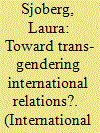

|
|
|
|
|
| Publication |
2012.
|
| Summary/Abstract |
This article engages with trans-theorizing to show how International Relations (IR) is currently blind to gender diversity, and the conceptual contributions trans-theorizing could make. To do so, it asks what insights trans-theorizing might provide for the study of global politics generally, and for feminist theorizing about gender in global politics specifically. After briefly introducing the terminology of trans-theorizing, the article addresses the potential for (and potential hazards of) an alliance between trans-theorizing and feminist theorizing in IR. The article then discusses several potential contributions of trans-theorizing-including hyper- and in-visibility, liminality, crossing, and disidentification-which provide explanatory leverage for IR. The article concludes with some suggestions for further collaboration between trans-theorizing and (feminist) IR to deepen and widen IR's work on gender specifically, and global politics generally.
|
|
|
|
|
|
|
|
|
|
|
|
|
|
|
|
| 5 |
ID:
130913
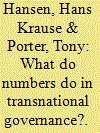

|
|
|
|
|
| Publication |
2012.
|
| Summary/Abstract |
This study examines how numbers in transnational governance constitute actors, objects, and relationships, including relationships of power. We review the existing literatures on numbers for insights relevant to their role in transnational governance, including the ontology of numbers, the history of numbers and their role in governance. On this basis, we set out the main distinctive ways that numbers are implicated in transnational governance. We conclude that studies of transnational governance would benefit from paying more attention to the much overlooked performative role of numbers in governance processes. Numbers have properties that differ from words, and shifts from one to the other in governance, for instance in the displacement of laws or norms with risk models or rankings based on numbers, have particular effects, including political effects on states, firms, individuals, and other actors and institutions.
|
|
|
|
|
|
|
|
|
|
|
|
|
|
|
|
|
|
|
|
|